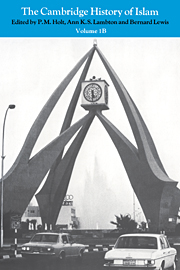Book contents
- Frontmatter
- Introduction
- Part IV The central Islamic lands in recent times
- 1 Modern Turkey
- 2 The Arab lands
- 3 Modern Persia
- 4 Islam in the Soviet Union
- 5 Communism in the central Islamic lands
- 6 The Political impact of the West
- 7 Economic and social change
- Dynastic lists
- Bibliography
- Glossary
- Index
- References
1 - Modern Turkey
from Part IV - The central Islamic lands in recent times
Published online by Cambridge University Press: 28 March 2008
- Frontmatter
- Introduction
- Part IV The central Islamic lands in recent times
- 1 Modern Turkey
- 2 The Arab lands
- 3 Modern Persia
- 4 Islam in the Soviet Union
- 5 Communism in the central Islamic lands
- 6 The Political impact of the West
- 7 Economic and social change
- Dynastic lists
- Bibliography
- Glossary
- Index
- References
Summary
Political developments: 1918–50
The War of Liberation and the downfall of the old régime
The Mudros armistice signed on 30 October 1918, by the government of Ahmed ‘Izzet Pasha appointed by the sultan for this task, marked the defeat of the Ottoman empire in the First World War. The war was fought valiantly on several fronts, but many officers and intellectuals with a new outlook on life and government realized that the war had proved the bankruptcy of Ottoman political and military philosophy, and threatened the independent existence of the Turks.
Defeat appeared inevitable as early as 1917, and compelled many officers and intellectuals to reckon with its consequences. The multinational Ottoman state could not be revived, whereas the unifying idea of a Turkish national state was barely emerging. The Allies had already agreed to divide the empire. On 13 November 1918, Allied troops landed in Istanbul and established a military administration. In the spring of 1919, the French advanced into the regions of ‘Ayntāb (later Gaziantep), Mar‘ash and Adana, the Italians landed in Antalya, and the British in Samsun and the Dardanelles. The sultan in Istanbul, Mehmed VI Vahīd al-Dīn, acquiesced in the occupation.
Soon he was busy persecuting the remaining Union and Progress leaders, after the main ones, Tal‘at, Enver and Jemāl Pashas, had fled abroad. The sultan's governments, headed alternatively by Tevfīq and Damad Ferīd Pashas, gradually became preoccupied mainly with defending the sultanate. The leading groups associated with the court and the Istanbul press appeared to have reconciled themselves with the idea of occupation.
- Type
- Chapter
- Information
- The Cambridge History of Islam , pp. 527 - 565Publisher: Cambridge University PressPrint publication year: 1977



